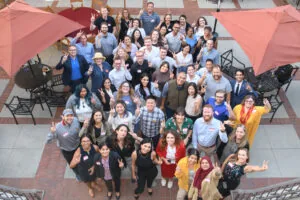Description
In August 2021, President Joe Biden ordered a full withdrawal of the U.S troops from Afghanistan, resulting in massive upheaval in the country. The overnight withdrawal left behind a humanitarian crisis: malnourished children, concerns about women safety and refugees in camps.
In this seminar, tech entrepreneurs and volunteers on the frontlines of the humanitarian response in Afghanistan discuss mobilizing technology in times of crises, funding channels of change — from aid to proactive innovation — and continuing to revolutionize technology in times of adversity through education, especially among young girls.
This panel features Sophia Mahfooz, British-Afghan tech entrepreneur and founder of Afghan Innovation; Luca Bucken, chief of staff to Alaa Murabit, UN high-level commissioner; and MJ Cantrell, Afghanistan war veteran. Moderated by Burçin Becerik-Gerber, professor and Chair of the Sonny Astani Department of Civil and Environmental Engineering at USC Viterbi School of Engineering.
Who Will Benefit
– Those looking to understand how technology mobilizes aid in humanitarian crises
– Students and volunteers who want to learn about challenges faced during the Afghanistan humanitarian crisis
– Those hoping to uncover how volunteers and entrepreneurs assisted Afghanistan during the withdrawal of U.S troops
About Our Featured Faculty
Burçin Becerik-Gerber is a professor and Chair of Civil and Environmental Engineering at the USC Viterbi School of Engineering. She is the founding director of the Innovation in Integrated Informatics and the Center for Intelligent Environments (CENTIENTS). Her research falls at the intersection of built environment, machine intelligence and systems thinking. Specifically, her work focuses on the acquisition, modeling and analysis of the data needed for user centered-built environments and the development of novel frameworks and visualization techniques to improve built-environment efficiency, while increasing user satisfaction. Becerik-Gerber graduated from Istanbul Technical University with a Bachelor of Architecture (1999) and an MS in Architecture (2001). She attended the University of California at Berkeley, where she received an MS in Civil and Environmental Engineering (2002). She earned her Doctor of Design (2006) degree from Harvard University in the field of project management and information systems. After graduating from Harvard University, she worked as a consultant and taught in the area of information automation and management for three years. To date, she has published more than 140 peer-reviewed papers, and her work has received support worth more than $8 million from a variety of sources. In 2012, Burçin was appointed as the inaugural holder of the Stephen Schrank Early Career Chair in Civil and Environmental Engineering. She is the recipient of MIT Technology Review’s TR35 Recognition (2012), NSF CAREER Award (2014), Viterbi Junior Research Award (2016), Mellon Mentoring Award (2017), Celebration of Engineering and Technology Innovation Award (CETI) in the Outstanding Early Career Researcher category from FIATECH (2018) and the Rutherford Visiting Fellowship at the Alan Turing Institute (2018). She serves as an associate editor for ASCE’s Journal of Computing in Civil Engineering since 2011.




